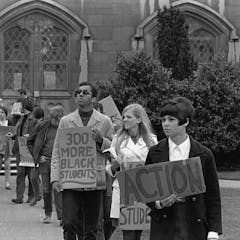
Articles on Washington state
Displaying all articles

States have experimented with taxes based on price, weight and potency, but competition is heating up as more states legalize and the market matures.

Redwoods grow in networks that house unique communities of plants and animals high in the air. They offer life lessons about adapting over time.

Nuclear weapons production and testing contaminated many sites across the US and exposed people unknowingly to radiation and toxic materials. Some have gone uncompensated for decades.

The largest dam removal project is moving forward on the Klamath River in California and Oregon. Tribal nations there have fought for decades to protect native fish runs and the ecology of the river.

Washington isn’t a state that typically comes to mind in discussions about student-led protests from the Civil Rights Movement. A Black history professor seeks to change that with a new book.

The ability of professors to freely teach and write about controversial topics without fear of retribution is nothing new.

Wildfires are remaking western US forests. Decisions about managing forests that have burned should factor in how fires change animal behavior and interactions between predators and prey.

Volcanoes might seem like nature’s incinerators, but using them to burn up trash would be dangerous and disrespectful to indigenous people who view them as sacred.

Salmon migrate thousands of miles from inland streams to the ocean and back. The newly enacted infrastructure bill includes funding to help salmon and other wild species on their way.

Even though Canadians and Americans living in the Pacific Northwest share the same earthquake risk, far more Canadians than American homeowners buy earthquake insurance. Why?

Nonprofits are being forced to do more with less money, which may force many of them to close within the next couple of years.

Two environmental engineers say governments need to do more to protect people from possible water contamination after wildfires.

Debating whether climate change or forest management has caused the devastating wildfires in California, Washington and Oregon is a false choice.

How climate change and other human actions have combined to create conditions for explosive wildfires in California, Oregon and Washington state.

With the race for the Democratic nomination narrowed to Joe Biden and Bernie Sanders, six more states went to the polls on March 10. We asked three scholars to interpret the results.

A new law in Washington state that makes college mostly free for many students is meant to prepare more residents from the state for jobs in the local economy. Whether it will work remains to be seen.

The ‘thin green line’ of resistance against any new infrastructure for shipping oil, gas and coal abroad has won many battles.

There are ways to reduce the risk of protests like France’s yellow vests movement.

The ‘thin green line’ of resistance against any new infrastructure for shipping oil, gas and coal abroad has won many battles. But it faces a new source of pressure: the Trump administration.

But many new governors and members of Congress intend to take action on climate change.
